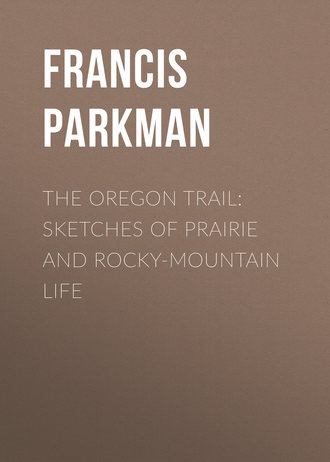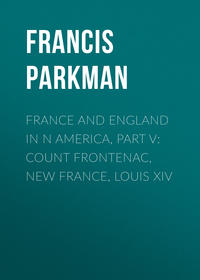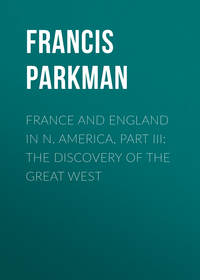 полная версия
полная версияThe Oregon Trail: Sketches of Prairie and Rocky-Mountain Life
When this ragamuffin horde had passed, we caught our horses, saddled, harnessed, and resumed our journey. Fording the creek, the low roofs of a number of rude buildings appeared, rising from a cluster of groves and woods on the left; and riding up through a long lane, amid a profusion of wild roses and early spring flowers, we found the log-church and school-houses belonging to the Methodist Shawanoe Mission. The Indians were on the point of gathering to a religious meeting. Some scores of them, tall men in half-civilized dress, were seated on wooden benches under the trees; while their horses were tied to the sheds and fences. Their chief, Parks, a remarkably large and athletic man, was just arrived from Westport, where he owns a trading establishment. Beside this, he has a fine farm and a considerable number of slaves. Indeed the Shawanoes have made greater progress in agriculture than any other tribe on the Missouri frontier; and both in appearance and in character form a marked contrast to our late acquaintance, the Kansas.
A few hours’ ride brought us to the banks of the river Kansas. Traversing the woods that lined it, and plowing through the deep sand, we encamped not far from the bank, at the Lower Delaware crossing. Our tent was erected for the first time on a meadow close to the woods, and the camp preparations being complete we began to think of supper. An old Delaware woman, of some three hundred pounds’ weight, sat in the porch of a little log-house close to the water, and a very pretty half-breed girl was engaged, under her superintendence, in feeding a large flock of turkeys that were fluttering and gobbling about the door. But no offers of money, or even of tobacco, could induce her to part with one of her favorites; so I took my rifle, to see if the woods or the river could furnish us anything. A multitude of quails were plaintively whistling in the woods and meadows; but nothing appropriate to the rifle was to be seen, except three buzzards, seated on the spectral limbs of an old dead sycamore, that thrust itself out over the river from the dense sunny wall of fresh foliage. Their ugly heads were drawn down between their shoulders, and they seemed to luxuriate in the soft sunshine that was pouring from the west. As they offered no epicurean temptations, I refrained from disturbing their enjoyment; but contented myself with admiring the calm beauty of the sunset, for the river, eddying swiftly in deep purple shadows between the impending woods, formed a wild but tranquillizing scene.
When I returned to the camp I found Shaw and an old Indian seated on the ground in close conference, passing the pipe between them. The old man was explaining that he loved the whites, and had an especial partiality for tobacco. Delorier was arranging upon the ground our service of tin cups and plates; and as other viands were not to be had, he set before us a repast of biscuit and bacon, and a large pot of coffee. Unsheathing our knives, we attacked it, disposed of the greater part, and tossed the residue to the Indian. Meanwhile our horses, now hobbled for the first time, stood among the trees, with their fore-legs tied together, in great disgust and astonishment. They seemed by no means to relish this foretaste of what was before them. Mine, in particular, had conceived a moral aversion to the prairie life. One of them, christened Hendrick, an animal whose strength and hardihood were his only merits, and who yielded to nothing but the cogent arguments of the whip, looked toward us with an indignant countenance, as if he meditated avenging his wrongs with a kick. The other, Pontiac, a good horse, though of plebeian lineage, stood with his head drooping and his mane hanging about his eyes, with the grieved and sulky air of a lubberly boy sent off to school. Poor Pontiac! his forebodings were but too just; for when I last heard from him, he was under the lash of an Ogallalla brave, on a war party against the Crows.
As it grew dark, and the voices of the whip-poor-wills succeeded the whistle of the quails, we removed our saddles to the tent, to serve as pillows, spread our blankets upon the ground, and prepared to bivouac for the first time that season. Each man selected the place in the tent which he was to occupy for the journey. To Delorier, however, was assigned the cart, into which he could creep in wet weather, and find a much better shelter than his bourgeois enjoyed in the tent.
The river Kansas at this point forms the boundary line between the country of the Shawanoes and that of the Delawares. We crossed it on the following day, rafting over our horses and equipage with much difficulty, and unloading our cart in order to make our way up the steep ascent on the farther bank. It was a Sunday morning; warm, tranquil and bright; and a perfect stillness reigned over the rough inclosures and neglected fields of the Delawares, except the ceaseless hum and chirruping of myriads of insects. Now and then, an Indian rode past on his way to the meeting-house, or through the dilapidated entrance of some shattered log-house an old woman might be discerned, enjoying all the luxury of idleness. There was no village bell, for the Delawares have none; and yet upon that forlorn and rude settlement was the same spirit of Sabbath repose and tranquillity as in some little New England village among the mountains of New Hampshire or the Vermont woods.
Having at present no leisure for such reflections, we pursued our journey. A military road led from this point to Fort Leavenworth, and for many miles the farms and cabins of the Delawares were scattered at short intervals on either hand. The little rude structures of logs, erected usually on the borders of a tract of woods, made a picturesque feature in the landscape. But the scenery needed no foreign aid. Nature had done enough for it; and the alteration of rich green prairies and groves that stood in clusters or lined the banks of the numerous little streams, had all the softened and polished beauty of a region that has been for centuries under the hand of man. At that early season, too, it was in the height of its freshness and luxuriance. The woods were flushed with the red buds of the maple; there were frequent flowering shrubs unknown in the east; and the green swells of the prairies were thickly studded with blossoms.
Encamping near a spring by the side of a hill, we resumed our journey in the morning, and early in the afternoon had arrived within a few miles of Fort Leavenworth. The road crossed a stream densely bordered with trees, and running in the bottom of a deep woody hollow. We were about to descend into it, when a wild and confused procession appeared, passing through the water below, and coming up the steep ascent toward us. We stopped to let them pass. They were Delawares, just returned from a hunting expedition. All, both men and women, were mounted on horseback, and drove along with them a considerable number of pack mules, laden with the furs they had taken, together with the buffalo robes, kettles, and other articles of their traveling equipment, which as well as their clothing and their weapons, had a worn and dingy aspect, as if they had seen hard service of late. At the rear of the party was an old man, who, as he came up, stopped his horse to speak to us. He rode a little tough shaggy pony, with mane and tail well knotted with burrs, and a rusty Spanish bit in its mouth, to which, by way of reins, was attached a string of raw hide. His saddle, robbed probably from a Mexican, had no covering, being merely a tree of the Spanish form, with a piece of grizzly bear’s skin laid over it, a pair of rude wooden stirrups attached, and in the absence of girth, a thong of hide passing around the horse’s belly. The rider’s dark features and keen snaky eyes were unequivocally Indian. He wore a buckskin frock, which, like his fringed leggings, was well polished and blackened by grease and long service; and an old handkerchief was tied around his head. Resting on the saddle before him lay his rifle; a weapon in the use of which the Delawares are skillful; though from its weight, the distant prairie Indians are too lazy to carry it.
“Who’s your chief?” he immediately inquired.
Henry Chatillon pointed to us. The old Delaware fixed his eyes intently upon us for a moment, and then sententiously remarked:
“No good! Too young!” With this flattering comment he left us, and rode after his people.
This tribe, the Delawares, once the peaceful allies of William Penn, the tributaries of the conquering Iroquois, are now the most adventurous and dreaded warriors upon the prairies. They make war upon remote tribes the very names of which were unknown to their fathers in their ancient seats in Pennsylvania; and they push these new quarrels with true Indian rancor, sending out their little war parties as far as the Rocky Mountains, and into the Mexican territories. Their neighbors and former confederates, the Shawanoes, who are tolerable farmers, are in a prosperous condition; but the Delawares dwindle every year, from the number of men lost in their warlike expeditions.
Soon after leaving this party, we saw, stretching on the right, the forests that follow the course of the Missouri, and the deep woody channel through which at this point it runs. At a distance in front were the white barracks of Fort Leavenworth, just visible through the trees upon an eminence above a bend of the river. A wide green meadow, as level as a lake, lay between us and the Missouri, and upon this, close to a line of trees that bordered a little brook, stood the tent of the captain and his companions, with their horses feeding around it, but they themselves were invisible. Wright, their muleteer, was there, seated on the tongue of the wagon, repairing his harness. Boisverd stood cleaning his rifle at the door of the tent, and Sorel lounged idly about. On closer examination, however, we discovered the captain’s brother, Jack, sitting in the tent, at his old occupation of splicing trail-ropes. He welcomed us in his broad Irish brogue, and said that his brother was fishing in the river, and R. gone to the garrison. They returned before sunset. Meanwhile we erected our own tent not far off, and after supper a council was held, in which it was resolved to remain one day at Fort Leavenworth, and on the next to bid a final adieu to the frontier: or in the phraseology of the region, to “jump off.” Our deliberations were conducted by the ruddy light from a distant swell of the prairie, where the long dry grass of last summer was on fire.
CHAPTER III
FORT LEAVENWORTHOn the next morning we rode to Fort Leavenworth. Colonel, now General, Kearny, to whom I had had the honor of an introduction when at St. Louis, was just arrived, and received us at his headquarters with the high-bred courtesy habitual to him. Fort Leavenworth is in fact no fort, being without defensive works, except two block-houses. No rumors of war had as yet disturbed its tranquillity. In the square grassy area, surrounded by barracks and the quarters of the officers, the men were passing and repassing, or lounging among the trees; although not many weeks afterward it presented a different scene; for here the very off-scourings of the frontier were congregated, to be marshaled for the expedition against Santa Fe.
Passing through the garrison, we rode toward the Kickapoo village, five or six miles beyond. The path, a rather dubious and uncertain one, led us along the ridge of high bluffs that bordered the Missouri; and by looking to the right or to the left, we could enjoy a strange contrast of opposite scenery. On the left stretched the prairie, rising into swells and undulations, thickly sprinkled with groves, or gracefully expanding into wide grassy basins of miles in extent; while its curvatures, swelling against the horizon, were often surmounted by lines of sunny woods; a scene to which the freshness of the season and the peculiar mellowness of the atmosphere gave additional softness. Below us, on the right, was a tract of ragged and broken woods. We could look down on the summits of the trees, some living and some dead; some erect, others leaning at every angle, and others still piled in masses together by the passage of a hurricane. Beyond their extreme verge, the turbid waters of the Missouri were discernible through the boughs, rolling powerfully along at the foot of the woody declivities of its farther bank.
The path soon after led inland; and as we crossed an open meadow we saw a cluster of buildings on a rising ground before us, with a crowd of people surrounding them. They were the storehouse, cottage, and stables of the Kickapoo trader’s establishment. Just at that moment, as it chanced, he was beset with half the Indians of the settlement. They had tied their wretched, neglected little ponies by dozens along the fences and outhouses, and were either lounging about the place, or crowding into the trading house. Here were faces of various colors; red, green, white, and black, curiously intermingled and disposed over the visage in a variety of patterns. Calico shirts, red and blue blankets, brass ear-rings, wampum necklaces, appeared in profusion. The trader was a blue-eyed open-faced man who neither in his manners nor his appearance betrayed any of the roughness of the frontier; though just at present he was obliged to keep a lynx eye on his suspicious customers, who, men and women, were climbing on his counter and seating themselves among his boxes and bales.
The village itself was not far off, and sufficiently illustrated the condition of its unfortunate and self-abandoned occupants. Fancy to yourself a little swift stream, working its devious way down a woody valley; sometimes wholly hidden under logs and fallen trees, sometimes issuing forth and spreading into a broad, clear pool; and on its banks in little nooks cleared away among the trees, miniature log-houses in utter ruin and neglect. A labyrinth of narrow, obstructed paths connected these habitations one with another. Sometimes we met a stray calf, a pig or a pony, belonging to some of the villagers, who usually lay in the sun in front of their dwellings, and looked on us with cold, suspicious eyes as we approached. Farther on, in place of the log-huts of the Kickapoos, we found the pukwi lodges of their neighbors, the Pottawattamies, whose condition seemed no better than theirs.
Growing tired at last, and exhausted by the excessive heat and sultriness of the day, we returned to our friend, the trader. By this time the crowd around him had dispersed, and left him at leisure. He invited us to his cottage, a little white-and-green building, in the style of the old French settlements; and ushered us into a neat, well-furnished room. The blinds were closed, and the heat and glare of the sun excluded; the room was as cool as a cavern. It was neatly carpeted too and furnished in a manner that we hardly expected on the frontier. The sofas, chairs, tables, and a well-filled bookcase would not have disgraced an Eastern city; though there were one or two little tokens that indicated the rather questionable civilization of the region. A pistol, loaded and capped, lay on the mantelpiece; and through the glass of the bookcase, peeping above the works of John Milton glittered the handle of a very mischievous-looking knife.
Our host went out, and returned with iced water, glasses, and a bottle of excellent claret; a refreshment most welcome in the extreme heat of the day; and soon after appeared a merry, laughing woman, who must have been, a year of two before, a very rich and luxuriant specimen of Creole beauty. She came to say that lunch was ready in the next room. Our hostess evidently lived on the sunny side of life, and troubled herself with none of its cares. She sat down and entertained us while we were at table with anecdotes of fishing parties, frolics, and the officers at the fort. Taking leave at length of the hospitable trader and his friend, we rode back to the garrison.
Shaw passed on to the camp, while I remained to call upon Colonel Kearny. I found him still at table. There sat our friend the captain, in the same remarkable habiliments in which we saw him at Westport; the black pipe, however, being for the present laid aside. He dangled his little cap in his hand and talked of steeple-chases, touching occasionally upon his anticipated exploits in buffalo-hunting. There, too, was R., somewhat more elegantly attired. For the last time we tasted the luxuries of civilization, and drank adieus to it in wine good enough to make us almost regret the leave-taking. Then, mounting, we rode together to the camp, where everything was in readiness for departure on the morrow.
CHAPTER IV
“JUMPING OFF”The reader need not be told that John Bull never leaves home without encumbering himself with the greatest possible load of luggage. Our companions were no exception to the rule. They had a wagon drawn by six mules and crammed with provisions for six months, besides ammunition enough for a regiment; spare rifles and fowling-pieces, ropes and harness; personal baggage, and a miscellaneous assortment of articles, which produced infinite embarrassment on the journey. They had also decorated their persons with telescopes and portable compasses, and carried English double-barreled rifles of sixteen to the pound caliber, slung to their saddles in dragoon fashion.
By sunrise on the 23d of May we had breakfasted; the tents were leveled, the animals saddled and harnessed, and all was prepared. “Avance donc! get up!” cried Delorier from his seat in front of the cart. Wright, our friend’s muleteer, after some swearing and lashing, got his insubordinate train in motion, and then the whole party filed from the ground. Thus we bade a long adieu to bed and board, and the principles of Blackstone’s Commentaries. The day was a most auspicious one; and yet Shaw and I felt certain misgivings, which in the sequel proved but too well founded. We had just learned that though R. had taken it upon him to adopt this course without consulting us, not a single man in the party was acquainted with it; and the absurdity of our friend’s high-handed measure very soon became manifest. His plan was to strike the trail of several companies of dragoons, who last summer had made an expedition under Colonel Kearny to Fort Laramie, and by this means to reach the grand trail of the Oregon emigrants up the Platte.
We rode for an hour or two when a familiar cluster of buildings appeared on a little hill. “Hallo!” shouted the Kickapoo trader from over his fence. “Where are you going?” A few rather emphatic exclamations might have been heard among us, when we found that we had gone miles out of our way, and were not advanced an inch toward the Rocky Mountains. So we turned in the direction the trader indicated, and with the sun for a guide, began to trace a “bee line” across the prairies. We struggled through copses and lines of wood; we waded brooks and pools of water; we traversed prairies as green as an emerald, expanding before us for mile after mile; wider and more wild than the wastes Mazeppa rode over:
“Man nor brute, Nor dint of hoof, nor print of foot, Lay in the wild luxuriant soil; No sign of travel; none of toil; The very air was mute.”Riding in advance, we passed over one of these great plains; we looked back and saw the line of scattered horsemen stretching for a mile or more; and far in the rear against the horizon, the white wagons creeping slowly along. “Here we are at last!” shouted the captain. And in truth we had struck upon the traces of a large body of horse. We turned joyfully and followed this new course, with tempers somewhat improved; and toward sunset encamped on a high swell of the prairie, at the foot of which a lazy stream soaked along through clumps of rank grass. It was getting dark. We turned the horses loose to feed. “Drive down the tent-pickets hard,” said Henry Chatillon, “it is going to blow.” We did so, and secured the tent as well as we could; for the sky had changed totally, and a fresh damp smell in the wind warned us that a stormy night was likely to succeed the hot clear day. The prairie also wore a new aspect, and its vast swells had grown black and somber under the shadow of the clouds. The thunder soon began to growl at a distance. Picketing and hobbling the horses among the rich grass at the foot of the slope, where we encamped, we gained a shelter just as the rain began to fall; and sat at the opening of the tent, watching the proceedings of the captain. In defiance of the rain he was stalking among the horses, wrapped in an old Scotch plaid. An extreme solicitude tormented him, lest some of his favorites should escape, or some accident should befall them; and he cast an anxious eye toward three wolves who were sneaking along over the dreary surface of the plain, as if he dreaded some hostile demonstration on their part.
On the next morning we had gone but a mile or two, when we came to an extensive belt of woods, through the midst of which ran a stream, wide, deep, and of an appearance particularly muddy and treacherous. Delorier was in advance with his cart; he jerked his pipe from his mouth, lashed his mules, and poured forth a volley of Canadian ejaculations. In plunged the cart, but midway it stuck fast. Delorier leaped out knee-deep in water, and by dint of sacres and a vigorous application of the whip, he urged the mules out of the slough. Then approached the long team and heavy wagon of our friends; but it paused on the brink.
“Now my advice is—” began the captain, who had been anxiously contemplating the muddy gulf.
“Drive on!” cried R.
But Wright, the muleteer, apparently had not as yet decided the point in his own mind; and he sat still in his seat on one of the shaft-mules, whistling in a low contemplative strain to himself.
“My advice is,” resumed the captain, “that we unload; for I’ll bet any man five pounds that if we try to go through, we shall stick fast.”
“By the powers, we shall stick fast!” echoed Jack, the captain’s brother, shaking his large head with an air of firm conviction.
“Drive on! drive on!” cried R. petulantly.
“Well,” observed the captain, turning to us as we sat looking on, much edified by this by-play among our confederates, “I can only give my advice and if people won’t be reasonable, why, they won’t; that’s all!”
Meanwhile Wright had apparently made up his mind; for he suddenly began to shout forth a volley of oaths and curses, that, compared with the French imprecations of Delorier, sounded like the roaring of heavy cannon after the popping and sputtering of a bunch of Chinese crackers. At the same time he discharged a shower of blows upon his mules, who hastily dived into the mud and drew the wagon lumbering after them. For a moment the issue was dubious. Wright writhed about in his saddle, and swore and lashed like a madman; but who can count on a team of half-broken mules? At the most critical point, when all should have been harmony and combined effort, the perverse brutes fell into lamentable disorder, and huddled together in confusion on the farther bank. There was the wagon up to the hub in mud, and visibly settling every instant. There was nothing for it but to unload; then to dig away the mud from before the wheels with a spade, and lay a causeway of bushes and branches. This agreeable labor accomplished, the wagon at last emerged; but if I mention that some interruption of this sort occurred at least four or five times a day for a fortnight, the reader will understand that our progress toward the Platte was not without its obstacles.
We traveled six or seven miles farther, and “nooned” near a brook. On the point of resuming our journey, when the horses were all driven down to water, my homesick charger, Pontiac, made a sudden leap across, and set off at a round trot for the settlements. I mounted my remaining horse, and started in pursuit. Making a circuit, I headed the runaway, hoping to drive him back to camp; but he instantly broke into a gallop, made a wide tour on the prairie, and got past me again. I tried this plan repeatedly, with the same result; Pontiac was evidently disgusted with the prairie; so I abandoned it, and tried another, trotting along gently behind him, in hopes that I might quietly get near enough to seize the trail-rope which was fastened to his neck, and dragged about a dozen feet behind him. The chase grew interesting. For mile after mile I followed the rascal, with the utmost care not to alarm him, and gradually got nearer, until at length old Hendrick’s nose was fairly brushed by the whisking tail of the unsuspecting Pontiac. Without drawing rein, I slid softly to the ground; but my long heavy rifle encumbered me, and the low sound it made in striking the horn of the saddle startled him; he pricked up his ears, and sprang off at a run. “My friend,” thought I, remounting, “do that again, and I will shoot you!”







